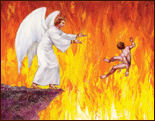Satan His Origin and Mission
By Bert Thompson
Satan His Origin and Mission looks at the person of Satan, exposing the reality surrounding his being. Where he came from? etc.
Contents of Satan His Origin and Mission
Is Satan Real? · · · · · · · · · · · · · · · · · · · · · · · · · · · · · · · · · · · 2
The Reality of Satan in the Old Testament . . . . . . . . . . 4
The Reality of Satan in the New Testament. . . . . . . . . . 6
Satan’s Origin · · · · · · · · · · · · · · · · · · · · · · · · · · · · · · · · · · · 8
Is Satan Deity? . . . . . . . . . . . . . . . . . . . . . . . . . . . . . . . . . . 8
Was Satan Created “Evil”? . . . . . . . . . . . . . . . . . . . . . . . . 9
Is Satan a Fallen Angel? . . . . . . . . . . . . . . . . . . . . . . . . . .11
When did Satan Become Evil? . . . . . . . . . . . . . . . . . . . . 13
Why has Satan Arrayed Himself Against Both God and Man? · 14
Why has God Allowed Satan to Continue to Exist?· · · 17
What is Satan’s Mission? · · · · · · · · · · · · · · · · · · · · · · · · · 19
How does Satan Carry Out His Mission Against Humanity? · 20
What are Satan’s Powers? · · · · · · · · · · · · · · · · · · · · · · · · · 22
What is Satan’s Ultimate Destiny? · · · · · · · · · · · · · · · · · · 25
Conclusion · · · · · · · · · · · · · · · · · · · · · · · · · · · · · · · · · · · · · · 26
Excerpts from the book
The Bible makes it clear that the devil is the originator, the father, of sin. John wrote: “[H]e that doeth sin is of the devil; for the devil sinneth from the beginning” (1 John 3:8). In speaking to this point, Wayne Jackson has written: “Disease, infirmity and death are ultimately the responsibility of Satan, for by his introduction of sin into the world, he brought about such woes and hence he is really the murderer of the human family (John 8:44)” [1980, p. 76].
Satan’s constant coercion and tantalizing temptation do not, and cannot, override man’s free will…. As an example of this point, consider the apostle who betrayed the Son of God. Overcome by the grotesque nature of his dastardly deed, Judas eventually lamented: “I have sinned in that I betrayed innocent blood” (Matthew 27:4). Even in his final hours, he did not attempt to lay the blame for his sin at someone else’s feet.
If we are responsible for our own actions, how, then, does Satan influence us to sin? In 2 Corinthians 2:11, Paul spoke of the fact that “no advantage may be gained over us by Satan: for we are not ignorant of his devices.” The word “devices” in this text derives from the Greek noemata, which “refers to intelligent notions, purposes, designs, devices, etc.” (Overton, 1976, 5[4]:3). In Ephesians 6:11, Paul admonished Christians to “put on the whole armor of God, that ye may be able to stand against the wiles of the devil.” The word “wiles” derives from the Greek methodeias, from which we get our English word “methods.” Methodeias “is from the Greek verb that means to trace; to investigate; to handle methodically; to handle cunningly…. The devil is a skilled artisan. He will deceive you if you do not work at the job of fighting back at him” (Overton, 5[4]:3).
There can be no doubt that, as “god of this world” (2 Corinthians 4:4), Satan is powerful in his own right. When the devil tempted the Son of God in the wilderness, he offered Him all the power and glory of the kingdoms of this world, if only He would fall down and worship him (Matthew 4:9). His justification for this insidious offer was based on his claim that, as the lord of this planet, he could offer its possessions to “whomsoever I will” (Luke 4:6). Interestingly, Jesus refuted neither Satan’s position as “god of this world” nor his ability to impose his will upon it. Erich Sauer therefore concluded:
This whole offer would have been unreal from the first for the Lord as a temptation, if some such legal basis for Satan’s dominion in the world had not existed. Otherwise, Jesus would only have had to point out that the necessary presuppositions for Satan’s legal claim to and ability to dispose of the glory of the world simply did not exist. The Lord however left this claim of the devil’s uncontradicted and merely declared that man should worship and serve God alone (Luke 4:8). With this He recognized in principle the tempter’s right to dispose of the kingdoms of this world in this present age. This same thought lies behind the various sayings of Jesus in which He calls Satan “the Prince of this world” (John 12:31; 14:30; 16:11) [1962, p. 66].


 Ministerial Requirement Not Covetous
Ministerial Requirement Not Covetous How can a loving God send people to hell?
How can a loving God send people to hell? Helpful Windows User Tip for "Searching Everything" on your PC.
Helpful Windows User Tip for "Searching Everything" on your PC.
